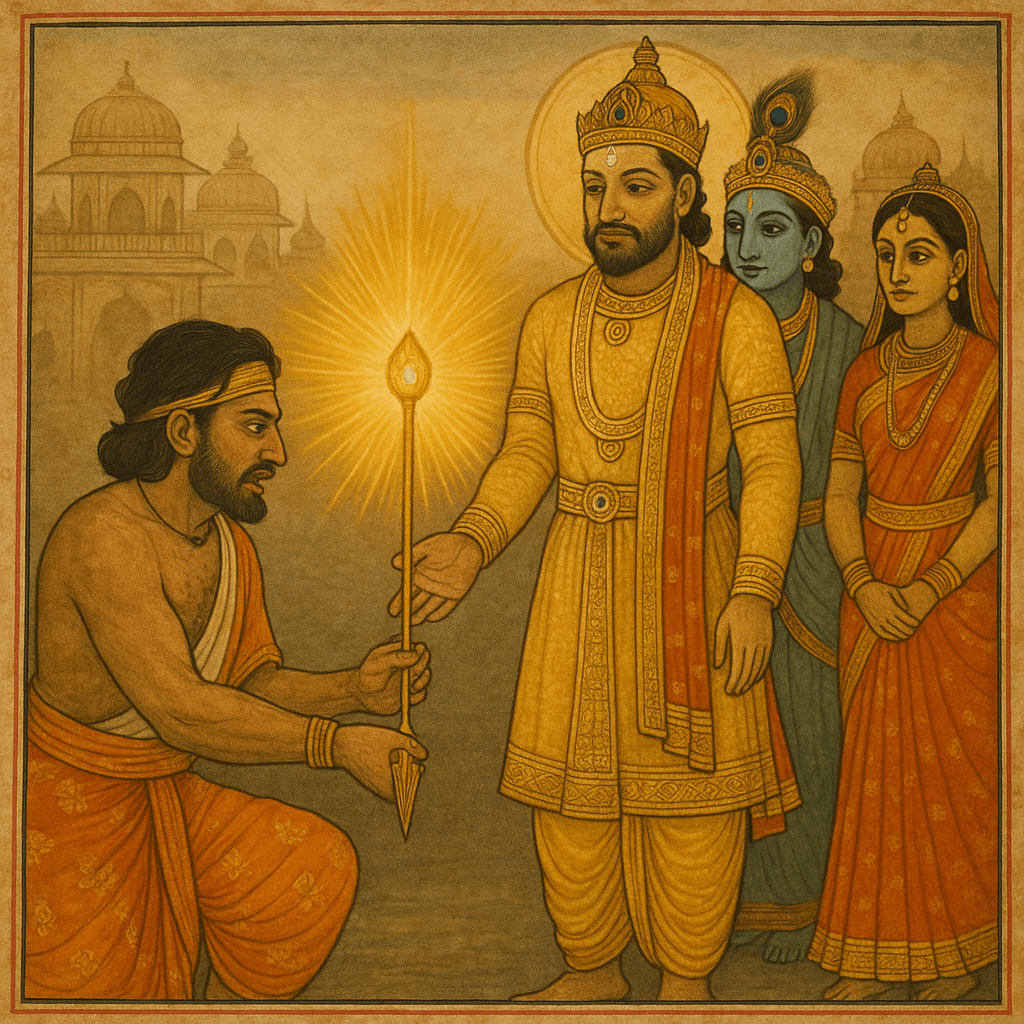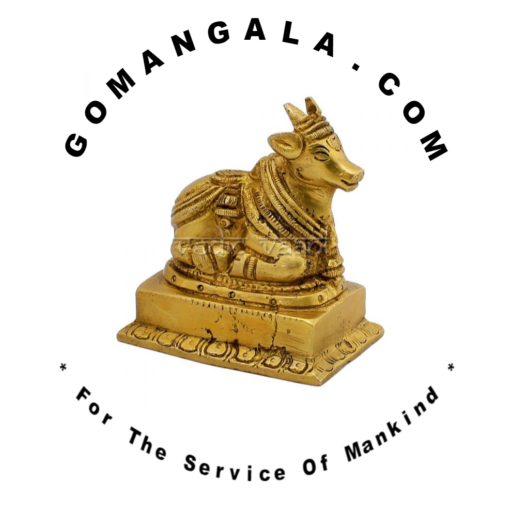Aishika Parva is the seventy-ninth upa parva included in the tenth maha parva, named Sauptika Parva. Vaishampayana continued the narration to Janamejaya in reply to his queries as follows.
What were the main contents of Aishika Parva?
The main contents of this Aishika Parva were three itemized subjects. First was to receive back the Aishika, a powerful weapon similar to the Brahmastra, including a Brahma Shira Mani, from Ashwathama. Second was to remove the curse on Ashwathama at the request of Uttara Kumari, wife of Abhimanyu. Third was to nominate a suitable person for the throne of Hastinavati palace as a later ruler after Yudhishthira. The inheritor to the throne was Prince Parikshit, the grandson of Arjuna, nominated by Yudhishthira.

One weapon, called Aishikastra, was gifted to Ashwathama by Krishna at Dwaraka, but it was given to him due to the hard efforts of his father Drona. It was very noble and powerful, but he used it for unlawful violence, such as killing Dhrishtadyumna, Shikhandi, and sleeping soldiers with a sword while they were resting at night in the camps. These actions were not suitable for a good person. Hence Krishna attempted to deprive Ashwathama of this weapon. The Brahma Shira Mani was also a divine, greatly prestigious item with him. Later, it was taken back from him and handed over to Yudhishthira at the desire of Draupadi.
Sanjaya was imprisoned as a war prisoner, but by luck he was set free. How?
अहमेकोऽवशिष्टस्तु तस्मान्सैन्यान्महीपते ।
मुक्तः कथंचिद्धर्मात्मन् वृष्णेः कृतवर्मणः ॥
Sanjaya was describing to Dhritarashtra the incidents of the seventeenth night. He was the only person alive after Kritavarma visited the war camp of the Pandavas. One charioteer of Dhrishtadyumna escaped just as Ashwathama was reaching there, and he ran to report to Yudhishthira, riding on his horse. Kritavarma freed Sanjaya, and he fled immediately to the Kaurava side camp to save his body and life. In the early morning, Sanjaya assessed the situation, but Bhima was then calling Duryodhana for the final mace fight near Dwaipayana Sarovara.
Why had Yudhishthira repented?
Yudhishthira repented after the Mahabharata war. Only seven persons were alive after the war, whereas the war had started with seven Akshohini soldiers on the Pandavas’ side. Only two persons were alive on the Kauravas’ side, though Duryodhana had started the war with eleven Akshohini soldiers. Kurukshetra was a place where his grandsire lay, and later it became fit only for birds and animals for many days. Hence Yudhishthira repented.
It was Duryodhana who canvassed Shalya first, on his way to meet Yudhishthira. Shalya alone met Yudhishthira and told him he possessed two Akshohini soldiers. Both sides would have been equal with nine Akshohinis in strength, but the Madra king Shalya had to join Duryodhana due to the hospitality provided by him. Yudhishthira had to kill Shalya in the war. Yudhishthira repented for the bad results of the war. Later Nakula was installed as the ruler of the North Madra kingdom. Also, Sahadeva was installed as the ruler of the South Madra kingdom.
What had Yudhishthira ordered Nakula?
Yudhishthira ordered him to bring back Draupadi and Uttara Kumari to Hastinavati with the message of success in the Mahabharata war. All the hundred Kauravas with Dushasana were killed in the war by Bhima alone. Arjuna fought and destroyed seven Akshohini soldiers. Nakula carried the message to Draupadi.
What had Bhima done when Draupadi visited the Pandavas’ war camps?
It was a very sad situation since all the Upapandavas were killed while sleeping. Bhima spoke with Draupadi and consoled her. Krishna also told them that the yoga of time was great. Bhima and Arjuna immediately captured Ashwathama and brought him before Yudhishthira for legal trial under the judgment of Krishna.
Why had Krishna granted Ashwathama the Brahma Shira Mani at Dwaraka?
Ashwathama was not married and he was a brahmachari. After many years of penance and wandering, he reached Dwaraka and visited Krishna. Ashwathama asked for Krishna’s wheel. Krishna agreed to his request, but it was very heavy and even using both hands, Ashwathama was unable to lift it. Then Krishna told Ashwathama to ask for some other item, as Krishna was ready to give according to his desire. Hence Ashwathama asked for the Brahmastra with great special powers, which was called the Brahma Shira Mani Astra. Aishika Astra was its real name.
Krishna thought it would not be good to leave the Brahma Shira Mani in the custody of Ashwathama. Bhima arrested Ashwathama when Arjuna used his own Brahmastra against him. Ashwathama was engaged in violent killings and in burning the tents of the Pandavas. Ashwathama was obliged to surrender before Yudhishthira. Krishna was also there and informed Draupadi to receive back the Brahma Shira Mani from Ashwathama. Accordingly, Ashwathama gave back his powerful astra, and later it remained under the custody of Yudhishthira for many years. Ashwathama was let free with good advice to continue his moral education under Vyasa at Badarikashrama. He traveled on his horse.
What was the difference in capacities between Arjuna and Ashwathama?
Arjuna was able to shoot the Brahmastra as well as to call it back or withdraw it. But Ashwathama was able to shoot it only; he could not withdraw it.
How had Krishna helped Uttara Kumari by giving protection against the curse?
Ashwathama used his powers to eradicate all the Pandavas, but Krishna nullified all such powers. Krishna helped Uttara Kumari by assuring longevity to her son, Prince Parikshit, before he was born. Parikshit later inherited the throne and became the next emperor, living for sixty years.
Why could Ashwathama never die?
Uttara Kumari cursed Ashwathama not to die but to live in this world as a Chiranjivi forever. Vyasa was also a Chiranjivi, and Ashwathama was similar to him.
What was the permanent message of Ashwathama?
Powerful weapons, in the wrong hands, always prove dangerous. Ashwathama had to join Duryodhana for his life and was therefore disliked by Krishna. But later he continued to live with Vyasa and became a peaceful model citizen.
Next post, Mahabharat: Ashwathama Nirgamana Parva would be more interesting. Mahabharat: Vishoka Parva will be presented separately in another article.
What are the benefits of reading this story?
On reading this story, children would gain more memory power, great moral strength in their lives in future; creating a sense of self-reliance, leading to peace and progress.
It is humbly prayed for the blessings of God Krishna upon us.
Readers may share this story with children, friends and family.

Leave a Reply